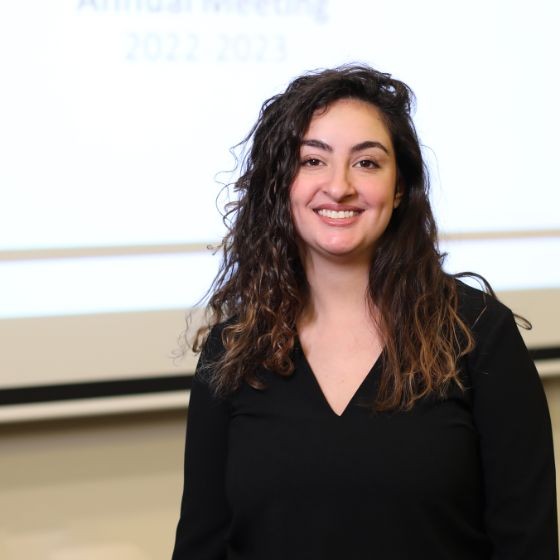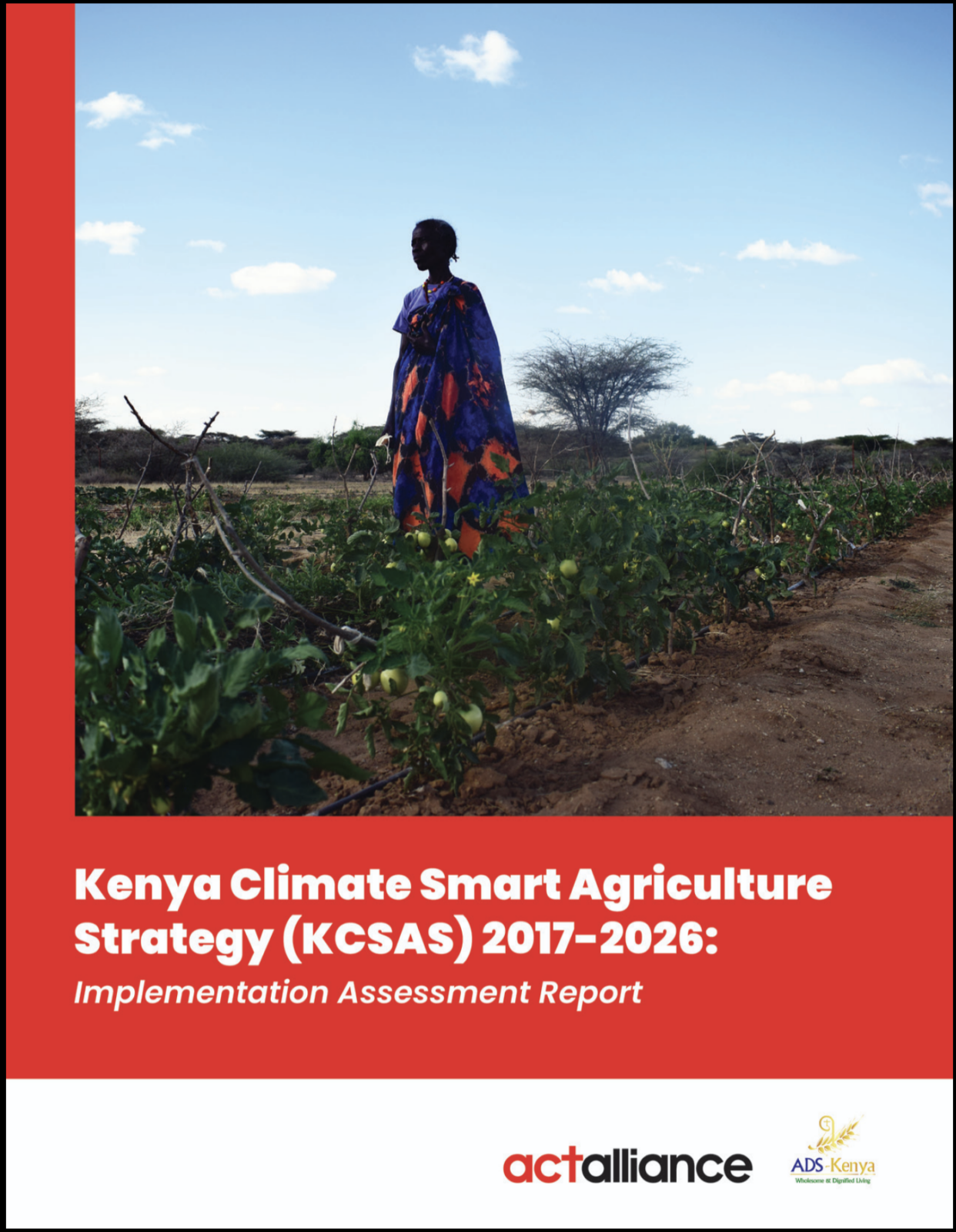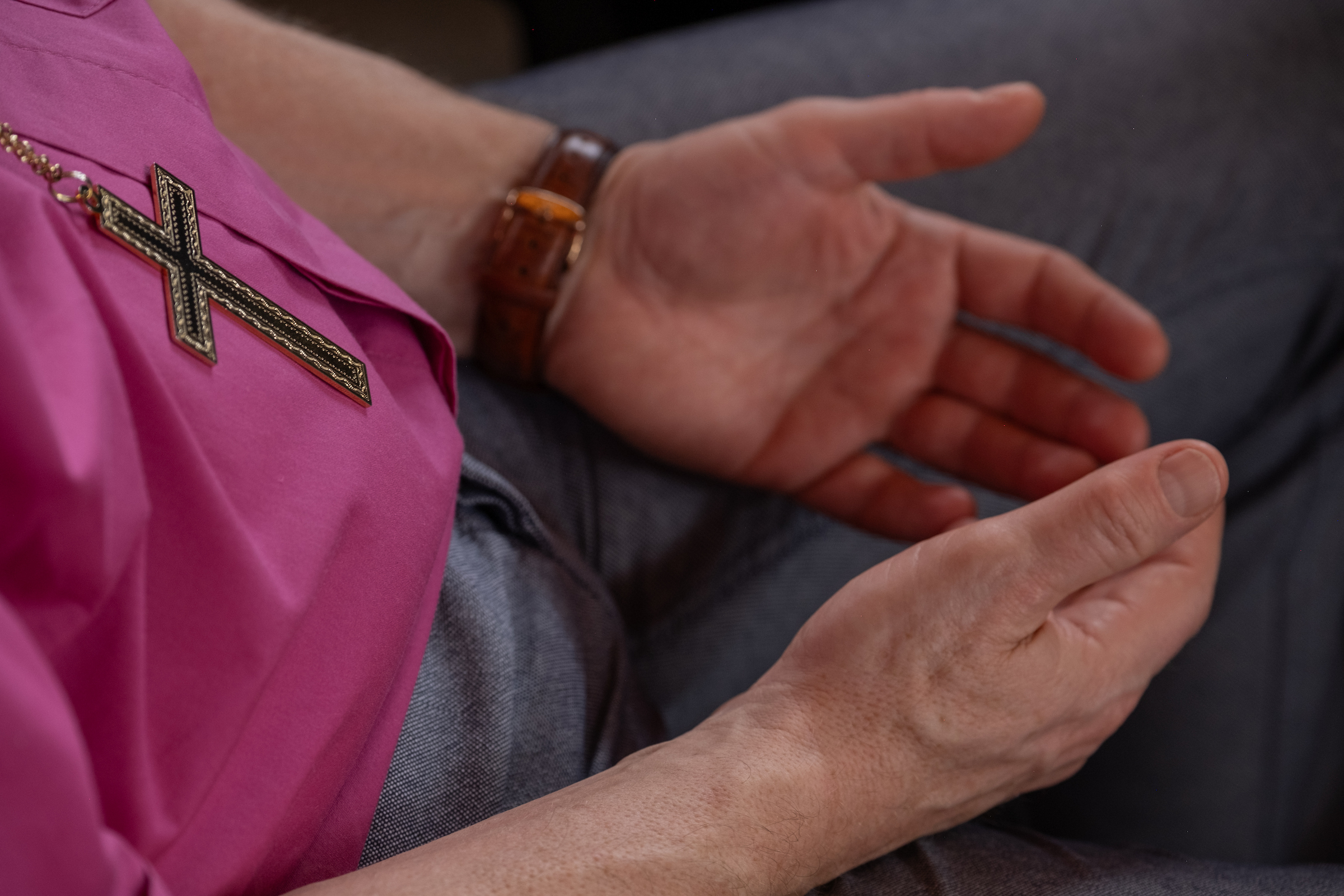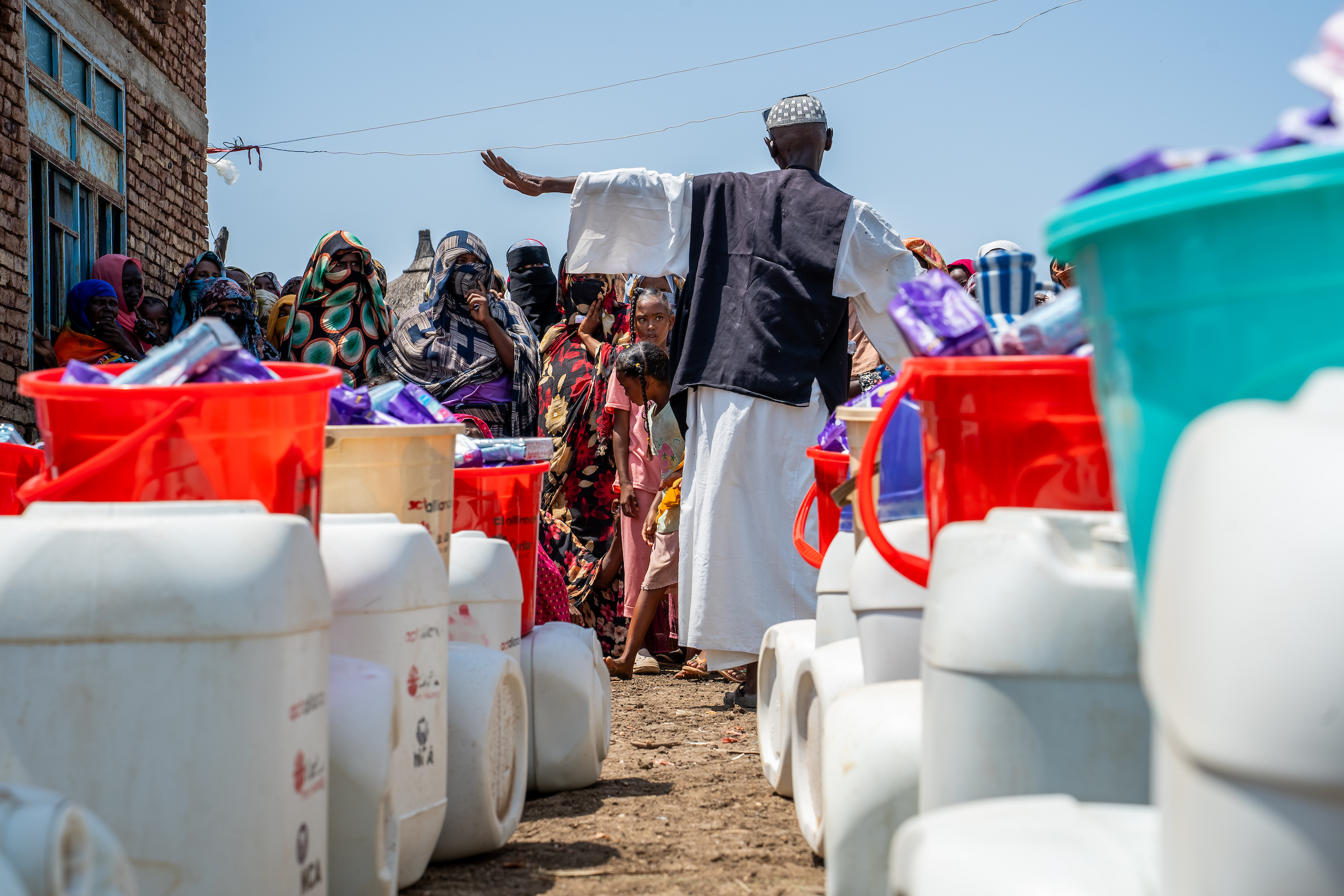Photo: Simon Chambers/ACT
Many of us are familiar with comments from members, allies and friends along the lines of “Why bother with COP? There are so few results. It’s inefficient and slow.” Or “With so much participation by oil and gas companies at COPs, is it still worth going as civil society?” We invited members’ thoughts on why the global UNFCCC climate conference matters. Their responses below might help you answer similar questions in future.
As frustrating as the COPs can be, and as slow as they seem in making substantive progress on tackling the climate emergency, members’ responses give a range of reasons for continued engagement on the part of the ecumenical movement and other civil society organisations.
ACT’s engagement with the global climate processes is driven by our humanitarian work and the impact of climate change our members have seen in vulnerable communities – the climate crisis makes everything worse for those communities and risks the gains of decades of development progress.
Why go?
Graham Gordon, head of Global Advocacy and Policy at ACT member Christian Aid recently summarized key reasons for civil society and faith-based organisations to stay involved in a LinkedIn article here.
First, he says, COPs help bring both the world’s and key political actors’ attention to major climate issues for the two weeks. He points to the example of Tuvalu’s prime minister standing knee deep in water to talk about rising waters caused by a changing climate. The mainstream media attention at COPs also gives activists a platform to draw attention to issues such as the amount spent by developed countries on fossil fuel subsidies.
“It is a chance for decision-makers to interact with those at the sharp end of climate change and step up their actions … COPs do bring bilateral and multilateral commitments,” he adds. These have included a commitment to 1.5 Celsius and to national climate change plans (NDCs).
As well, he notes, faith-based actors who attend COPs join with all those calling for climate justice. “We stand in solidarity, recognising that we are not calling for charity, but for wealthy nations to accept their historical responsibility for the climate impacts and to take action that is needed,” he says.
Youth perspectives: “our future at risk”
In their recent ACT News article, Rosa Pedersen and Sofie Pultz, climate assistants at DanChurchAid, said:
“Without NGOs, researchers, and activists relentlessly holding leaders accountable [at COP29], the outcomes would have been even weaker … if civil society steps away, who is left? Fossil fuel lobbyists and indecisive politicians? That’s a scenario we cannot accept…it’s the only global political forum we have for coordinated climate action. Without it, the future becomes even more uncertain, even more vulnerable…As young climate delegates, we know the stakes. This is our future at risk.”
Learning as citizens of the world
Frank M. Mbilinyi of the Evangelical Lutheran Church In Tanzania (ELCT) noted the impact his COP experiences have on his teaching and his students.
“Two of my students asked me: ‘Why are you busy with COP29 and you are not an international leader, how can your voice be heard from where you are?’ I explained my position as a youth to learn more from experienced people, activists and leaders from different big and small institutions….Through C0P29 I have a chance to share my perspectives from an educational point of view on matters like adaptation, mitigation and gender. My experience of observing how matters are handled during COP29 negotiations on climate finance and how questions are being asked gives me power and strength to keep teaching students on climate change. And to advocate for change.”
Collins Omondi Omundu, Advocacy Officer for LWF’s Kenya-Somalia Country Programme notes:
“In addressing climate change and doing advocacy on climate justice, we all need in our programming and in our personal capacities to be part of the conversation. We are a part of our communities and citizens of the world and thus have an obligation to contribute to such discourses which affects people across religions, nationalities and social class no matter their circumstances.”
“As we work around our programming, we influence the policies and demand for accountability on concrete actions on addressing climate change in an effort to make the world a better place for the human race to enjoy optimal life. We can only enrich what we do by including best practices of what works from such gatherings as COP29.”
As people of faith
ACT participates in COPs as part of a larger ecumenical delegation which includes ACT members and partners, including the World Council of Churches. ACT brings a faith-based perspective to its engagement in the climate conferences, as those below note. Not only that, it is a way of acting upon our Christian beliefs and Gospel teachings, including that all are made in the image of God.
Lizzy Harnett, COP29 delegate for the Episcopal Church, USA:
“The energy transition is already underway, and we should not give up hope or discount the progress made in the last 30 years of COPs. The Paris Agreement from COP21, for example, has transformed the narrative and expectation on climate change mitigation and adaptation. Yet, we know there is so much more to do. We must ensure that the climate actions being taken by governments, companies and civil society reflect the needs of the most vulnerable and most at-risk countries and communities.”
“Although imperfect, the COP process is the best avenue for such conversations and consensus on a global scale. Joining with our brothers and sisters from around the world to unite for the better stewarding of God’s creation is a source of great hope and responsibility, and a truly unique opportunity to witness for and contribute to climate action.”
Rev. Fred Milligan, Presbyterians for Earthcare, USA:
“People of faith must become engaged in the conversation around climate change if ever religious leaders or the leaders of our international and national governments are to act in meaningful ways for climate justice. As climate change is a global phenomenon, this engagement must necessarily include opportunities such as the annual COPs.”
“These gatherings enable us to coordinate with and learn from members of the global community of faith and other partners of good will as well as the scientific community and political leaders. They help us to inspire and be inspired to continue the struggle for the sake of both current and future generations and other forms of life.”
Rev. Matthew Zemanick, Evangelical Lutheran Church in America (ELCA) / LWF:
“Frankly, I am still wrestling with the question of why we participate in COPs. When I worked at a grassroots, local-led environmental justice NGO, this was a question my colleagues and I would ask those going. Now working in the context of directing an international program which facilitates the ELCA’s disaster risk reduction and mental health and psychosocial support work, I would answer my own question with three reasons:
- The Church has an obligation to ensure needs are met, especially those of society’s most vulnerable, including with the government.
- COP is the only international forum among those with power to mobilise collective resources to address the needs to mitigate, adapt, and respond to the climate emergency.
- People of faith from frontline communities have expressed a profound need for emotional and spiritual support. Faith leaders provide an invaluable ministry of presence as an expression of giving solidarity with all crying for justice.
Rvdo. Richard Acosta Rodríguez, La Iglesia Episcopal:
“COP no ha sido lo mejor ni lo que se esperaba, pero es lo que hay, es decir, sigue siendo el espacio más propicio de participación y de elevar la voz ante las naciones y líderes del mundo en favor de las voces sufrientes del mundo que no son escuchadas y en favor de los seres de la creación que no tienen voz o cuya voz no es entendible en lenguajes humanos y que también están clamando al cielo.
El Hijo de Dios se encarnó, se hizo creación, la asumió; es decir, en su designio salvador tomó la forma de criatura. También, como cristianos, debemos asumir los dramas y las realidades humanas y las del mundo, por tanto debemos aprovechar los espacios brindados, así a veces parezca que se nada contra la corriente.
Aunque realizamos nuestro trabajo en pequeñas congregaciones o desde nuestras diócesis, a veces ese trabajo no tiene la repercusión esperada (al punto de ser llamados “gigantes dormidos”). Sí se está trabajando, se está creando consciencia, se están moviendo corazones, pero esa voz a veces tiene que hacerse escuchar desde las instancias más altas como voz profética que grita en el desierto. Sí, debemos aprovechar esos espacios y plantar la perspectiva cristiana, la de la vida, la justicia, la de la mayordomía con la creación. Debemos gritar al mundo que estamos llamados a administrar, no a depredar; estamos llamados a cuidar a imagen y semejanza del Dios de la vida y la armonía. No nos podemos callar aunque el Goliat se vea difícil de derrotar.”
A vital forum for all countries to come together
The COPs remain one of the few places where countries of the world come together to negotiate a crucial issue. This has far reaching effects, some of which are only clear after the dust of the event has settled.
Robin Okumu, COP29 delegate for The Episcopal Church, USA:
“While sometimes the formalities of parliamentary procedure can ring of hollow rhetoric, COP is still very important for giving visibility and voice to all parties – allowing everyone to speak – especially the least developed countries and small island states.
In our world filled with shouting and noise, the COP structure itself sends a powerful message. We, from the Global North, have a unique chance to hear from the voices of the Global South. This helps counter growing isolationist mindsets, as it broadens our perspective, widens our understanding of what is happening across the world, and sows the seeds of empathy for those suffering the worst effects of climate change.
The pavilion spaces at COP are especially exciting – the Faith Pavilion, for example, brings together people from different traditions across the world united under a common goal. Pavilion spaces like this bring humanity and hope. They balance large scale, dry discussions with a necessary spirit of compassion and interconnectedness. They underscore the moral and ethical dimensions of this crisis, and remind us of our humanity and hope. COP allows parties to collaborate in all their diversity and to work towards unity. Even though it’s imperfect and progress can be very slow, COP still provides the vital forum where the world’s countries come together to discuss the climate crisis.”




